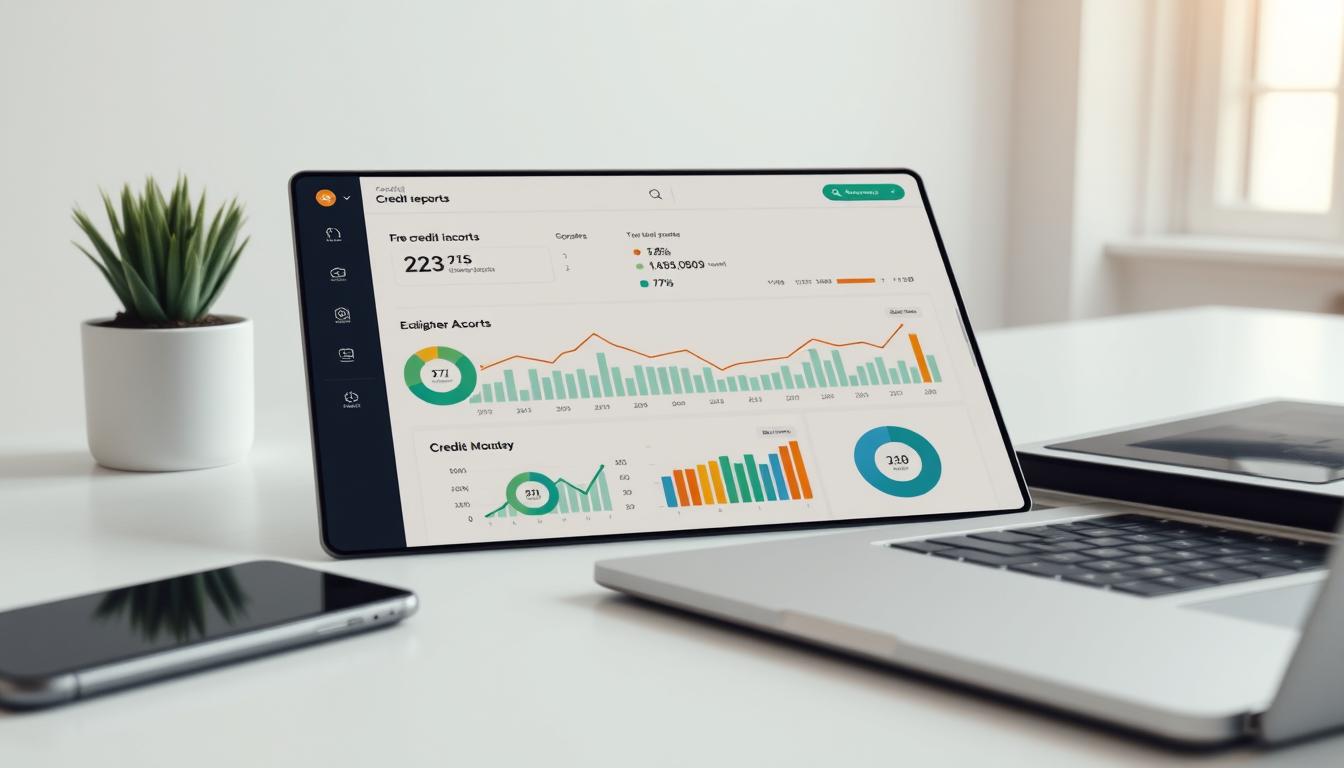Understanding EMS credit inquiries is vital for a healthy credit profile. These inquiries can affect your credit report and score. This guide explores EMS credit inquiries and how to manage your creditworthiness.
We’ll cover different types of credit inquiries and their impact. You’ll learn to monitor your credit report and spot potential issues. We’ll also discuss maintaining a good credit utilization ratio.
Finally, we’ll look at credit monitoring services and risk assessment. You’ll gain insights into disputing errors on your credit report.
Key Takeaways
- Understand the different types of credit inquiries and their impact on your credit score
- Learn how to monitor your credit report and identify potential issues or identity theft
- Discover the importance of maintaining a healthy credit utilization ratio
- Explore the benefits of credit monitoring services and credit risk assessment
- Gain insights into the credit bureau dispute process and how to resolve credit report errors
What is an EMS Credit Inquiry?
An EMS credit inquiry is a hard credit check done by employers. It’s part of the hiring process to review your credit report. Employers use this to assess your financial responsibility and creditworthiness.
Types of Credit Inquiries
Credit inquiries come in two main types: hard and soft. Hard inquiries, like EMS checks, can affect your credit score. These often happen when you apply for new credit.
Soft inquiries don’t impact your credit score. They’re used for credit report monitoring or pre-approvals.
Impact on Credit Scores
EMS credit inquiries can slightly lower your credit score. Each inquiry may drop your score by a few points. But this effect usually fades within months.
Keep an eye on the number of hard inquiries in your credit history. Too many can hurt your overall creditworthiness.
| Type of Inquiry | Impact on Credit Score |
|---|---|
| Hard Inquiry | Temporary decrease (few points) |
| Soft Inquiry | No impact |
“Understanding the different types of credit inquiries and their impact on your credit score is crucial when managing your financial health.”
Monitoring Your Credit Report
Regularly checking your credit report is vital for a healthy financial profile. It helps spot errors and fraud, ensuring your credit information is accurate. Let’s explore why credit report monitoring matters and how to do it effectively.
Watching your credit score and credit history isn’t just about money management. It’s a key step in guarding against identity theft. Regular reviews can catch unauthorized activity early, protecting your financial well-being.
- Regular credit report monitoring helps you stay informed about your financial standing and catch any potential issues early on.
- Monitoring your credit score allows you to track changes and understand how your financial behaviors are impacting your creditworthiness.
- Analyzing your credit history can uncover any inaccuracies or fraudulent activities, enabling you to address them promptly.
- Proactive identity theft protection measures, such as monitoring your credit report, can help you minimize the potential for financial losses and reputational damage.
Making credit report monitoring a habit keeps you informed and financially strong. It safeguards your identity and secures your financial future. Start monitoring today for peace of mind.

Understanding Credit Utilization Ratio
Your credit utilization ratio is key to your credit score. It shows how much of your available credit you’re using. Managing this ratio can boost your creditworthiness.
Calculating Credit Utilization
To find your credit utilization ratio, divide your total credit card balances by your total credit limit. For example, if you owe $3,000 with a $10,000 limit, your ratio is 30%.
Ideal Credit Utilization Range
- Experts suggest keeping your credit utilization ratio below 30% for a healthy credit profile.
- A ratio below 10% is excellent, showing responsible credit management and boosting your credit score check.
- A low credit utilization ratio is vital for building and maintaining a strong credit report monitoring history.
| Credit Utilization Ratio | Impact on Credit Score |
|---|---|
| Below 10% | Excellent |
| 10% to 30% | Good |
| Above 30% | Poor |
A low credit utilization ratio shows responsible credit use. This can have a positive effect on your overall credit score check.
ems credit inquiry
An EMS credit inquiry happens when lenders check your credit report. It’s used to assess your creditworthiness for a specific application or service. Understanding this process can help you manage your credit score effectively.
EMS credit inquiries can impact your credit score. A single inquiry usually has little effect. However, multiple inquiries in a short time can harm your credit history analysis.
It’s crucial to know the types of credit inquiries. They can affect your credit report monitoring and credit score check differently.
Types of Credit Inquiries
- Hard inquiries: These occur when a lender checks your credit report as part of an application for a new credit card, loan, or other financial product. Hard inquiries can temporarily lower your credit score.
- Soft inquiries: These happen when you or an authorized party, such as a potential employer or landlord, checks your credit report. Soft inquiries do not affect your credit score.
Knowing the difference between hard and soft inquiries is key. It helps you make smart decisions about your credit. You can better manage your financial health with this knowledge.

“Staying on top of your credit report and monitoring for any suspicious activity is crucial in today’s digital landscape.”
Regular credit report monitoring is essential. It helps you spot and fix any errors quickly. This practice maintains a healthy credit profile.
By staying vigilant, you can reduce the impact of ems credit inquiries. This helps protect your credit score check and credit history analysis.
Identity Theft Protection
Identity theft is a growing concern in our digital world. It threatens your credit and financial health. Protecting your personal info is key to maintaining a strong credit profile.
Signs of Identity Theft
Spotting identity theft early is crucial. Watch for these warning signs:
- Unfamiliar charges on your credit card or bank statements
- Unexpected bills or collection notices for accounts you didn’t open
- Declined credit applications or lower credit limits without explanation
- Unusual activity on your credit report monitoring or credit score check
Preventive Measures
To reduce identity theft protection risks, try these steps:
- Regularly review your credit history analysis and monitor for any suspicious activity
- Use strong and unique passwords for all your accounts, and enable two-factor authentication whenever possible
- Be cautious of phishing scams and never share personal information over unsecured channels
- Shred sensitive documents before disposing of them
- Consider enrolling in a credit monitoring service to stay informed about any changes to your credit profile
Knowing the signs of identity theft is vital. Taking action to protect your info helps shield your credit.
Stay vigilant and use these tips to safeguard your financial well-being. Your future self will thank you.
Credit Dispute Resolution
Accurate credit reports are vital for your financial health. Spotting errors in your credit info? Act fast and dispute them. The dispute process helps fix mistakes and keep your credit history accurate.
Let’s explore how to tackle credit report issues effectively. By addressing problems promptly, you’ll protect your financial standing and boost your credit profile.
Understanding the Credit Dispute Process
Credit disputes involve talking to credit bureaus about report errors. Here’s what you need to do:
- Review your credit report thoroughly to identify any discrepancies, such as incorrect account information, erroneous payment history, or identity theft-related issues.
- Gather supporting documentation, such as receipts, statements, or correspondence, to substantiate your claim.
- Contact the credit bureau(s) responsible for the inaccurate information and initiate the dispute process, either online, by mail, or by phone.
- Provide the credit bureau(s) with the necessary information and evidence to support your dispute.
- Monitor the status of your dispute and follow up if the issue is not resolved within the specified timeframe.
Importance of Credit Report Monitoring
Regular credit report monitoring helps catch and fix issues quickly. Check your credit score and credit history analysis often. This way, you can spot problems and act fast.
Being proactive protects your finances and keeps your credit dispute resolution on track. It’s a key step in maintaining good credit health.

Fixing credit report errors is crucial for your financial well-being. Understanding the credit dispute resolution process gives you control. It ensures your credit info stays accurate and up-to-date.
Credit Monitoring Services
A strong credit profile is vital in today’s financial world. Credit monitoring services offer a powerful tool for this purpose. These services provide credit report updates, fraud alerts, and identity theft protection.
You can stay informed about your credit and take steps to protect your finances. This empowers you to maintain your financial well-being effectively.
Benefits of Credit Monitoring
Credit monitoring services offer many benefits for managing your credit effectively. Here are some key advantages:
- Regular credit report updates: Receive periodic updates on your credit report, allowing you to quickly identify and address any changes or errors.
- Fraud alerts: Receive timely notifications of suspicious activity on your credit account, enabling you to take immediate action to protect yourself from identity theft.
- Identity theft protection: Many credit monitoring services provide comprehensive identity theft protection, including assistance with identity restoration and credit repair.
- Credit score monitoring: Track your credit score fluctuations and receive alerts when significant changes occur, helping you understand your creditworthiness.
- Credit history analysis: Gain insights into your credit history, identifying areas for improvement and opportunities to strengthen your overall credit profile.
Credit monitoring services help you stay informed about your credit status. You can address issues quickly and keep your credit profile healthy. This proves helpful when applying for loans, mortgages, or other financial products.
Proactivity is key to effective credit management. Credit monitoring services are a valuable tool for your financial toolkit. They empower you to control your financial future and protect your credit reputation.
Credit Risk Assessment
Evaluating your credit risk is vital for financial health. Creditors analyze your credit risk assessment to determine your ability to repay debts. This includes reviewing your credit report, score, and history.
Lenders use this data to decide on approving loans and credit cards. Your creditworthiness affects their decision-making process.
To assess credit risk, lenders look at several key factors:
- Credit Report Monitoring: Lenders examine your credit report for potential issues. They look for late payments and high credit usage. Regularly checking your credit report helps maintain good credit health.
- Credit Score Check: Your credit score shows your creditworthiness numerically. A high score improves approval chances and interest rates.
- Credit History Analysis: Lenders review your past borrowing and repayment patterns. A solid credit history proves your ability to manage debt responsibly.
Understanding credit risk assessment helps you improve your creditworthiness. You can take steps to boost your chances of getting financial products.
Regular credit report monitoring is crucial for navigating the credit landscape. Maintaining a healthy credit score and credit history helps achieve your financial goals.

“Monitor your credit risk assessment for financial success. A strong credit profile opens doors to new opportunities. It helps you achieve your financial dreams.”
Credit Bureau Dispute Process
Found errors in your credit report? It’s vital to know how to dispute them. This process helps fix issues that may impact your credit score check or credit history analysis.
Addressing these errors can improve your financial profile. It ensures your credit report accurately reflects your creditworthiness.
Steps to Dispute Errors
Here’s how to dispute errors with Experian, Equifax, and TransUnion:
- Get a copy of your credit report from each bureau. Look for any mistakes or odd entries.
- Collect proof like payment receipts or court records to back up your claims.
- Write to the credit bureaus. Clearly explain the errors and include your supporting documents.
- File your credit bureau dispute online or by mail using their dispute process.
- Keep an eye on your credit report monitoring and watch for the bureau’s response.
This process helps maintain a strong credit score check. It ensures your report accurately shows your financial history.
“Accurate credit reporting is essential for maintaining a healthy financial profile. Taking the time to dispute errors can make a significant difference in your overall credit history analysis.”
| Credit Bureau | Dispute Process | Contact Information |
|---|---|---|
| Experian | Online, mail, or phone | www.experian.com/disputes, P.O. Box 4500, Allen, TX 75013, 1-888-397-3742 |
| Equifax | Online, mail, or phone | www.equifax.com/personal/credit-report-services/credit-dispute, P.O. Box 740256, Atlanta, GA 30374, 1-800-685-1111 |
| TransUnion | Online, mail, or phone | www.transunion.com/credit-disputes/dispute-your-credit, P.O. Box 2000, Chester, PA 19016, 1-800-916-8800 |
Conclusion
We’ve explored EMS credit inquiries and their impact on your credit report and score. Understanding credit inquiries helps you maintain a healthy financial profile. You can now navigate the credit landscape with confidence.
Stay informed and proactive to control your financial future. Monitor your credit report regularly. Keep an eye on your credit utilization ratio. Address any discrepancies or signs of identity theft promptly.
Your credit history is crucial for financial well-being. Understanding EMS credit inquiries is just the start. Stay vigilant and manage your credit wisely. Commit to financial responsibility to achieve your goals.

